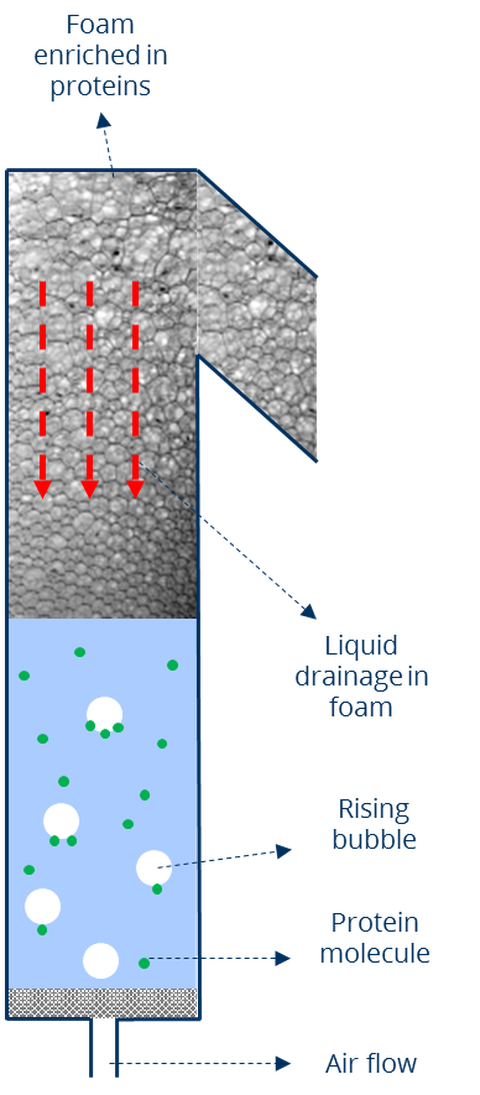Particle-stabilized adsorptive bubble separation of tagged enzymes
Contact person: Dr.-Ing. Sascha Heitkam (Principal Investigator), Dr.-Ing. Karin Schwarzenberger
Project staff: Dr. Behnam Keshavarzi
Funding: Deutsche Forschungsgemeinschaft (DFG), grant number HE 7529/2-1
Cooperation: Professur für Molekulare Biotechnologie, TU Dresden
Motivation:

Foam flotation of proteins
Enzymes are proteins with certain functionality and are very important in biotechnology with applications in food, medicine, chemical production, etc. However, affordable provision of enzyme has been always a major bottleneck. A main concern here is the lack of cost-efficient methods for separation of enzymes from crude media that preserve the enzymatic activity as well. In this regards, adsorptive bubble separation (ABS) seems to be a promising approach. In ABS, target molecules adsorb to the interface of rising air bubbles injected into the aqueous solution, and are transported by them to the solution top forming a foam at the top. The entrained liquid in the foam drains down while the foam flows over a weir and is collected. The target materials are regained by foam extraction and liquefaction.
However, two main factors regarding the enzyme separation in ABS are that 1) Direct adsorption of the target enzyme to the gas-liquid interface results in denaturation and consequently loss of catalytic activity and 2) surfactants are not allowed to be used to provide the foam stability in the case of enzymes since the surfactants act as effective inhibitors of enzyme function and, even more subsequent separation of surfactants from enzymes is difficult.
Therefore, in this work, a tag is introduced on the enzyme molecules so the tag gets in direct contact of the bubbles interface and keeps the enzyme away from the interface. In addition, the tag enhances the foam stability required for proper separation.
Goals:
- Attachment of a molecular tag to the target enzyme that increases the adsorption rate at the interface, while potentially diminishing direct contact between active moiety of the enzyme and interface.
- Studying proteins/enzymes adsorption on rising bubbles.
- Optimizing the flotation process in order to enhance the protein adsorption on the rising bubble as well as providing an optimum foam stability to achieve the highest recovery and grade. When it is needed, particles can also be added to enhance the foam stability.
- Modeling the protein flotation process in order to perform parametric study on different operational parameters as well as for upscaling purposes.
Methods:
- Dynamic surface tension tests (PAT, Sinterface): to measure the dynamics of protein adsorption on air interface, investigating the irreversible adsorption of proteins.
- Flow-on-bubble tests: to evaluate the protein adsorption on rising bubbles.
- Dynamic foam analysis (DFA-100, Kruss): to study the behavior of protein foams, e.g. by measuring the coarsening rate and the foam liquid fraction with time.
- Flotation experiments: to evaluate the separation efficiency of proteins in ABS separation.
Results:
- Flotation can enhance the concentration of the enzymes, however, the activity measurements showed a considerable enzymatic activity loss upon contacting enzymes with the bubbles.
- It was found that many proteins (e.g. Bovine serum albumin) adsorb irreversibly on the bubble interface.
- The rising bubble was emulated through flow-on-bubble experiments.
- Foam coalescence accelerates the liquid drainage leading to higher protein enrichment
- A modeling was proposed to estimate recovery and grade in protein flotation
Publications:
- Behnam Keshavarzi, Thomas Krause, Sidra Sikandar, Karin Schwarzenberger, Kerstin Eckert, Marion Ansorge-Schumacher and Sascha Heitkam: Protein Enrichment by Adsorptive Bubble Separation: Experimental and Modeling. Chemical Engineering Science 256 (2022) 117715
- Behnam Keshavarzi, Thomas Krause, Karin Schwarzenberger, Marion Ansorge-Schumacher, Kerstin Eckert, Sascha Heitkam, Application of Flotation for Enzyme Purification, EUFOAM 2020 CONFERENCE, 6th-9th July, virtual meeting.
- Behnam Keshavarzi, Thomas Krause, Karin Schwarzenberger, Marion Ansorge-Schumacher, Kerstin Eckert, Sascha Heitkam, Evaluation of Protein Adsorption on Rising Bubbles, Annual meeting of the Processnet technical groups MPH and CFD, 9th-10th March 2021, virtual meeting.
- Behnam Keshavarzi, Thomas Krause, Karin Schwarzenberger, Marion Ansorge-Schumacher, Kerstin Eckert, Sascha Heitkam, Protein Enrichment by Flotation: Optimum Foam stability, ECIS 2021, 5th-10th September 2021, Athens, Greece.
- Behnam Keshavarzi, Thomas Krause, Karin Schwarzenberger, Marion Ansorge-Schumacher, Kerstin Eckert, Sascha Heitkam, Removal of Impurities From Protein Foam In Foam Fractionation Process by Wash Water Addition, 3rd-6th July 2022, Krakow, Poland.
